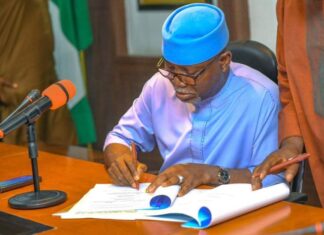Catholic Bishops alert Abuja, rising poverty demands robust solutions
By Jeph Ajobaju, Chief Copy Editor
Fuel subsidy removal without mitigating the effects has driven Nigeria to the brink of collapse, the Catholic Bishops Conference of Nigeria (CBCN) has warned Bola Tinubu, stressing the President should have thought through palliatives before yanking off subsidy.
The Nigeria Employers Consultative Association (NECA) has urged Abuja to urgently address the pains of citizens caused by the removal of subsidy on petrol.
CBCN President Lucius Ugorji raised the alarm in a sermon at the Maria Assumpta Cathedral, Owerri at the weekend, insisting Nigeria is headed for the precipice if effective measures are not taken urgently to tackle the economic crisis raving the country.
“The suffering in the land has over the years been galloping uncontrollably. Our growing economic crisis became exacerbated with the recent withdrawal of petrol subsidy by the Federal Government. Indeed, Nigeria is on the brink of collapse,” Ugorji said.
“Government has not ceased to inundate citizens with it’s fabled palliative measures to cushion the effects of the subsidy removal. I am sure those running the nation’s affairs at all levels know that palliative measures can never be a cure for any economic or health challenge.
“If Nigerians are given food items as palliatives, we will definitely go hungry again, after consuming the food. So, I ask: Why waste resources on palliative measures, instead of attacking the problems frontally?
“Provision of a constant source of energy remains the driving force in all developing and developed economies. Why is ours different? Why should we not subsidise fuel?
__________________________________________________________________
Related articles:
Catholic Bishop urges Tinubu to distribute N8,000 palliative fairly
Rights activists decry Tinubu’s N70b bribe for lawmakers as subsidy removal palliative
Tinubu’s palliative will be looted like they did COVID-19 intervention, says Atiku
__________________________________________________________________
Failure of law enforcement bane of Nigeria
“We have severally been told that some people have been enriching themselves from our commonwealth through petrol subsidy. For many patriotic citizens, this argument does not hold water,” Ugorji added, per Vanguard.
“Why has the government failed, is unwilling or incapable of identifying the supposed culprits and bringing them to account for their sordid act?
“There is a lot of deceit and corruption in the land. How can anybody explain why and how the former administration hurriedly commissioned the Dangote Refinery, which is yet to start production? So, why the haste in commissioning an unfinished project?
“There is also the fabled story of the supposed Nigerian airline and how an aeroplane was hired or borrowed to flag off its operation. Where is the airline today? Has anyone been asked to account for the act? This is not a good national testimonial.
“The root of Nigeria’s problem is massive corruption. For Nigeria to survive, we must collectively fight corruption, whichever way it rears its ugly head.
“Government must be told that we cannot afford the luxury of punishing the entire populace because of the corrupt tendencies of a few. This is not fair to all concerned.”
NECA urges government to address citizens’ pains
In its own reaction, NECA warned any strike or mass protest amid the hardship and suffering could cause a breakdown of law and order with risks for businesses and the country as a whole.
It also urged the government to urgently take immediate steps to ameliorate the economic trauma faced by workers, other citizens, and businesses.
A statement issued by NECA Director General Wale-Smatt Oyerinde argued that any disruption of businesses in the form of a strike or mass protest will exacerbate the current unemployment rate and drag many further down the poverty line.
Oyerinde recounted businesses in the formal and informal sectors lost more than N5 trillion to vandalism caused by thugs who hijacked the #EndSARS protest in 2020.
“Any strike, the threat of mass action or civil disobedience that could potentially disrupt economic activities or businesses, especially those in the formal and informal sectors which could compromise sustainability and job creation, based on economic policies of the government which are non-employment related, will be counter-productive,” he said.
‘’While organised labour is at liberty to engage with government on behalf of its members on issues of welfare as they relate to the impacts of any economic policy, sometimes deadlock may hold sway.
“When that happens, the consequential action by organised labour should not, in any way, hinder anyone from going about their businesses peacefully or cause anyone to be intimidated or harassed.
“We re-emphasise the importance of social dialogue, a potent instrument of the International Labour Organisation, ILO, and a globally accepted mechanism for dispute resolution.”











